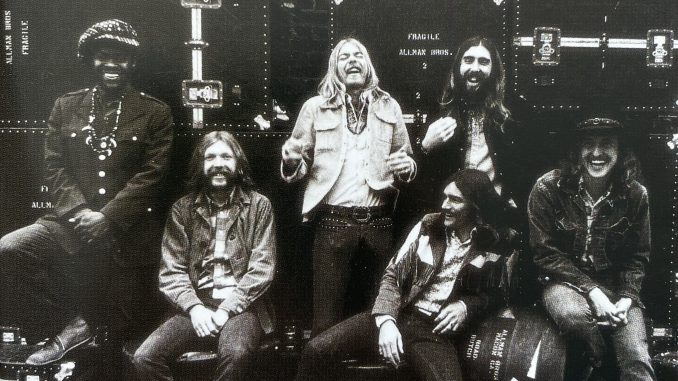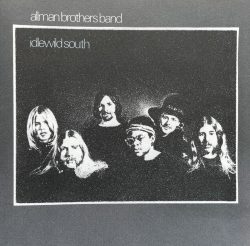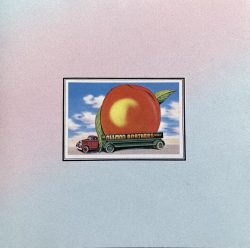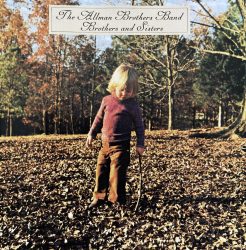
Features Editor Clint West writes: Welcome to a new fortnightly feature ‘Americana Bedrock’. The series will explore some of the artists that have laid down the foundations of what we now refer to as ‘americana’. AUK writer Lyndon Bolton not only kick-starts the series for us, but he also slams it into gear and roars off down the americana highway to set the course with a brilliant appreciation of the work and influence of the Allman Brothers Band. Look out for more writers following behind Lyndon’s dust cloud in the forthcoming weeks and months.
Gregg Allman and his brother Duane with Dickey Betts, Berry Oakley, Butch Trucks and Jai Johanny ‘Jaimoe’ Johanson, collectively The Allman Brothers Band created what came to be known as southern rock, a blend of blues, rock, country and jazz. Many other bands who drew on some or all of those components were to join this exciting new genre. Its capital was Macon, Georgia and soon it had its own record label, Capricorn Records. But if you savour those individual strands for a bit do not be surprised if you start asking yourself, “isn’t this what we now call americana?” The correct answer is “yes” and these brothers, their band and many others around them can consider themselves firmly embedded in the very foundations of today’s americana.
Famous for their breathtaking jams, the Allmans were best appreciated live. Their most creative years were short, from their formation and eponymous debut album in 1969 until their fifth album, ‘Brothers and Sisters’ in 1973 by which time both Duane and bassist Berry Oakley had been killed in motorcycle accidents. The band split in 1976 but amid a lifestyle that would have finished many, Gregg Allman managed to keep going through two band reformations and the departure of Betts. Into the 2000s Allman with guitarists Warren Haynes and Derek Trucks and bassist Oteil Burbidge breathed new life into the band. For many years they played an annual string of shows at the Beacon Theatre in New York. As Allman became increasingly ill the band played for the last time in 2014. He died three years later.
This writer’s introduction to The Allman Brothers came in 1974 with ‘Brothers and Sisters’ and their double live album, ’At Fillmore East’. That same year he and 25,000 others saw the Allmans at the dilapidated old Roosevelt Stadium in Jersey City. The New York Times described the event thus, “From an extramusical standpoint, the concert resembled a mini‐Woodstock, complete with all the implicit communality and explicit filth that legend evokes”. By then, without Duane and Oakley but with their by far greatest commercial release, ‘Brothers and Sisters’, The Allmans were playing to massive audiences including a record breaking 600,000 at the Watkins Glen Summer Jam with the Grateful Dead and The Band a year previously. Gregg Allman maintained the blues tradition but the newer material rang to the lighter more country touch of Betts, now lead guitarist. Though the jams featured heavily, The Allmans relied less on pure blues but on a broader mix that would certainly qualify as americana. Back to the NYT, “But the Allmans achieve more than that through the sheer inventiveness and virtuosity of their instrumentals”.
Though a cornerstone of americana the Allmans’ finest hour will always be ‘At Fillmore East’. The blistering intensity of Duane’s solos as he swapped lead with Betts, Gregg’s shimmering keyboards and heartrending vocals all powered by Oakley’s bass, Trucks’ massive drum kit and Jaimoe’s percussion still hit the spot. Whether the old blues numbers, ‘Statesboro Blues’, ‘Trouble No More’, ’One Way Out’ or the searing jams ‘In Memory of Elizabeth Reed’, ‘Whipping Post’ and ‘Mountain Jam’, that record compiled from two shows at the Fillmore East in March 1971 has lost none of its immediacy and fury. For full pleasure go for the remastered version, also produced by Tom Dowd.
The original discography is short. To quote Duane, “we get kind of frustrated doing the (studio) records”. Playing live, jamming and improvisation based on a solid foundation of blues was what the Allmans were all about. Brought up by their mother, mostly in Daytona Beach, Florida, the brothers got into music at a young age. Visiting their grandparents back in Nashville they went to see Otis Redding. As Gregg said in his autobiography, ‘My Cross to Bear’, “That music hit Duane. That music was in his heart, and it was in mine too. Then we got to playing it, and we realised how important it was”. One afternoon Mrs Allman returned home from work to find her boys being taught guitar by their school janitor, an accomplished bluesman himself. Bands followed for the brothers, The Allman Joys and out in LA, Hour Glass. Duane had also built a strong reputation as a session musician, not least for his dedication and inventiveness. At Rick Hall’s Fame Studios in Muscle Shoals during the late 1960s he recorded with Aretha Franklin, Wilson Picket and Clarence Carter among many others. (For full appreciation listen to ‘Duane Allman an Anthology’).
Back in Macon the brothers hooked up with Betts, Oakley, Trucks and Jaimoe calling themselves The Allman Brothers Band. Their blend of rock, blues, country and jazz attracted a growing following. In 1969 they released their first album ‘The Allman Brothers Band’ on Atlantic then on Phil Walden’s Capricorn Records. A relatively modest debut, the album introduces their versatility, such as the jazz influenced ‘Dreams’ and blues classic ‘Trouble No More’ that became staples of the live show. On the subsequent album a year later, ’Idlewild South’, the blues come to the fore. The Allmans resented being thought of purely as a rock band. Blues was their foundation and it comes out loud and clear. Just about all the tracks feature on their next release, ‘Fillmore’.
A bright future beckoned but tragedy struck twice. By the time of their fourth record in 1972, ‘Eat A Peach’, Duane Allman and Berry Oakley were dead. This double album reverberates with total loss and upheaval in its mix of live and studio material. A highlight is Duane’s painfully sad instrumental ‘Little Martha’. In complete contrast Gregg’s ‘Ain’t Wastin’ Time No More’ in tribute to his brother howls with bitter anger. ‘Blue Sky’ shows the country side of Betts. This theme, which now would be called americana, reappears on ‘Brothers and Sisters’ released a year later. Vocally Betts added a distinctly country feel. ‘Ramblin’ Man’ is a fine example compared to Allman’s gravelly ‘Wasted Words’. The classic instrumental ‘Jessica’ would get the full jam treatment when played live. To properly appreciate the deep and varied roots of Dickey Betts dig out a marvellous Old Grey Whistle Test special, ‘Macon Whoopee.’ Made in 1976 Bob Harris went to Phil Walden’s Capricorn Picnic festival to meet several artists on his roster, as well as another guest and fan of southern music, Governor Jimmy Carter. The whole programme is well worth watching but to solidify the Allman Brothers americana bedrock go straight to 16mins:48secs. On his porch Betts gives Whispering Bob a masterful demonstration of his roots by playing in the style of Hank Williams, Jimmie Rodgers, Blind Willie McTell and Robert Johnson. If the brothers were blues Betts was definitely americana.
 Thereafter, turmoil was never far from the Allman Brothers Band as they split, reformed and dissolved once again. Members came and went as they made albums that fell far short of their predecessors. For the third coming in 1989 guitar virtuoso Warren Haynes joined. Harking back to Duane, his blues style added some much needed stability as following a protracted dispute, Betts was eventually fired. Butch Trucks’s nephew Derek, still in his early twenties, who had performed as a guest of the band became a full time member in 1999 steadying the band further. Shows sharpened and the Beacon runs turned into an annual celebration.
Thereafter, turmoil was never far from the Allman Brothers Band as they split, reformed and dissolved once again. Members came and went as they made albums that fell far short of their predecessors. For the third coming in 1989 guitar virtuoso Warren Haynes joined. Harking back to Duane, his blues style added some much needed stability as following a protracted dispute, Betts was eventually fired. Butch Trucks’s nephew Derek, still in his early twenties, who had performed as a guest of the band became a full time member in 1999 steadying the band further. Shows sharpened and the Beacon runs turned into an annual celebration.
Gregg continued to perform and record with a very fine band including guitarist Scott Sharrard, a highlight being his 2011 ‘Low Country Blues’ album but those Beacon Theatre shows had become a glorious reunion of so many people whose lives had gone in many different directions since the 1970s but all were still united in their love for The Allman Brothers Band. By 2014 Gregg looked weak but he held it together as they played the old songs. Haynes and Trucks, such versatile guitarists themselves, jammed as if Duane had been there. Truly a night to remember, not just for this writer but for all fans, as this run was to be their last. After only four shows Gregg fell ill again. The rest were postponed until October when The Allman Brothers Band played their final show.
Shortly before Gregg, Butch Trucks also died in 2017 leaving Betts and Jaimoe the last of the 1969 line-up. Encouragingly, the next generation has taken up the baton in their own way. Well worth investigating are The Allman Betts Band consisting of Devon Allman, Duane Betts and Berry Duane Oakley.
They were born of the blues that surrounded their southern upbringing but that alone does not define The Allman Brothers Band. Of course, Duane will always be best remembered for those blues jams but from his work at Muscle Shoals to his last recordings on ‘Eat A Peach’ his unquenchable thirst for experimentation pushed his boundaries far across genres. If coming at it from more country roads, Betts too cannot be confined to any single genre. Gregg Allman did it all. If your americana house is to have strong foundations then be ready with some Allman Brothers Band for the mix.



Marvellous appreciation Lyndon, faultless. I still get emotional listening to “Fillmore East” Favourite version being the “1971 Fillmore recordings” – six c.d.’s of every note played(?) over those four sets. Plus the bonus of a set from 27/06/71 at the Fillmore. so very much more Duane had to give.
Thanks Andy, that means a lot. The Allmans are among my closest musical companions. What a great version of ‘Fillmore East’ you have. I trust you have ‘Fillmore West ’71’ too!
Thanks for a great piece about an amazing group. One of my favorite musical memories is seeing the Allman Brothers in Sarasota, FL in April, 1971. It was a magical evening. They played the great blues numbers and most of what would be on Eat a Peach including Mountain Jam. I very grateful to my friend who insisted I had to get up and out to see them.
Thank you. You must keep very good company and to have seen the original line-up at their peak is quite something. Coincidentally, it was in Sarasota a few years ago that I came across Berry Duane Oakley’s band. Dickey lives there too.
Love this article. 🩵🍑 Also saw The Allman Brothers in Sarasota while in High School…69-70’s.🍑Siesta Key was also a stop for Greg… if memory serves. Burt Engelsman was a friend who played bass for a bit w/ Allman Brothers🎼
Very nice article. The first time I heard At Fillmore East start to finish in 1974, I was completely hooked. In Memory of Elizabeth Reed is the greatest live performance ever recorded.